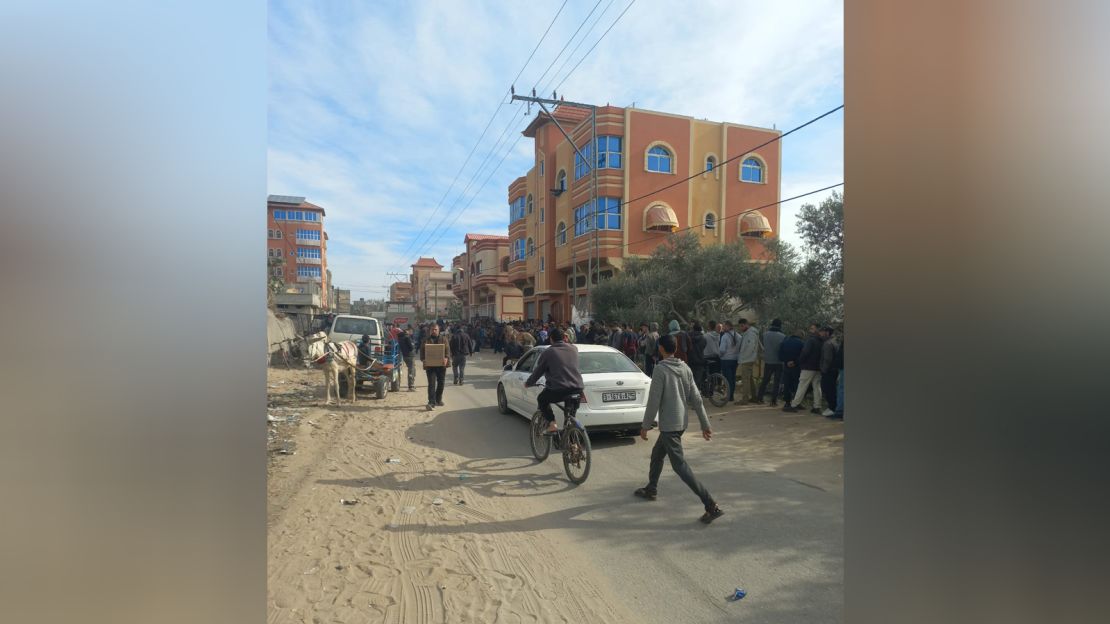‘We are dying slowly:’ Palestinians are eating grass and drinking polluted water as famine looms across Gaza
Mohammed Hamouda, a physical therapist displaced to Rafah, remembers the day his colleague, Odeh Al-Haw, was killed trying to get water for his family. Al-Haw was queueing at a water station in Jabalya refugee camp, in northern Gaza, when he and dozens of others were struck by Israeli bombardment, Hamouda said.
“Unfortunately, many relatives and friends are still in the northern Gaza Strip, suffering a lot,” Hamouda, a father-of-three, . “They eat grass and drink polluted water.” Israel’s blockade and restrictions on aid deliveries mean stocks are desperately low, driving up prices and making food inaccessible to people across Gaza. Shortages are even worse in the northern parts of the strip, according to the UN, where Israel concentrated its military offensive in the early days of the war. Communication blackouts stifle efforts to report on starvation and dehydration in the region.
“People butchered a donkey to eat its meat,” Hamouda says friends in Jabalya told him earlier this month as shortages worsened.
In what could be a serious blow to humanitarian efforts, several Western countries have suspended funding to the main UN agency in Gaza, the United Nations Relief and Works Agency for Palestine Refugees in the Near East (UNRWA) in recent days over explosive allegations by Israel that several of its staffers participated in the October 7 attacks. The UN fired several employees in the wake of the allegations.
Jordan’s foreign minister urged those countries suspending funding to reconsider, saying UNRWA was a “lifeline” for more than 2 million Palestinians in Gaza and that the agency shouldn’t be “collectively punished” over allegations against a dozen of its 13,000 staff.
‘No clean water’
Gihan El Baz cradles a toddler on her knee while comforting her children and grandchildren, who she says wake each day “screaming” for food.“In the shelters, there is not enough food, the sun sets on us, and we haven’t even had any lunch,” El Baz, who lives with 10 relatives inside a weather-worn tent in Rafah, She nurses her husband, who she says fell and broke his arm while dizzy from exhaustion.
“There are no drinks, no clean water, no clean bathrooms, the kid cries for a biscuit and we can’t even find any to give her.”
Displaced parents in Rafah, where OCHA reported more than 1.3 million residents of Gaza have been forced to flee, say the stress of being unable to protect their children from bombardment is compounded by their inability to provide enough food. Limited access to electricity makes perishable goods impossible to refrigerate. Living conditions are overcrowded and unsanitary.
“People are forced to cut down trees to get firewood for heating and preparing food. Smoke is everywhere and flies spread widely and transmit diseases,” said Hazem Saeed Al-Naizi, the director of an orphanage in Gaza City who fled south with the 40 people under his care – most of whom are children and infants living with disabilities.
Challenges to food distribution, blocked aid
Shadi Bleha, 20, is trying to feed a family of six. Twice a week, they receive two water bottles, three biscuits and “sometimes” two cans of food from UNRWA, he said. “It is not enough to meet my family’s needs at all,” the student, who is sheltering in a tent in Rafah, Palestinians in southern Gaza that poorly regulated humanitarian distribution means some civilians get no aid at all, while those who do may sell for profit.In other cases, vendors purchase aid from merchants and trade at markets for inflated costs. Some people with cars travel further afield to get water, returning to displacement camps to resell water for hiked prices. Intensified strikes also raise prices. Three weeks ago, a 25-kilogram bag of flour cost $20 in Khan Younis, according to Al-Naizi, but after the IDF intensified attacks on the southern city, it became $34. Others say they receive humanitarian parcels that have been opened, with items missing. Dates, olive oil and cooking oil found in aid packages are reportedly sold on the black market for more than double their value.

Both UNRWA and WFP . while they could not verify reports of individuals reselling aid for higher prices, it is entirely possible given the scale of desperation and hunger in Gaza.
“It’s absolute chaos and people are absolutely desperate, people are absolutely hungry,” added Touma. “The clock is indeed ticking for famine.”
WFP told CNN that aid distributions are based on verified beneficiary lists and observed by food monitors, who “report back that the food is delivered to its intended recipients.”
“Sometimes families make a personal decision to sell WFP food in exchange for other household items that they might need. To be clear, any food distributed by the WFP is not for sale,” the agency said in a statement.
The war has also caused widescale loss of employment in Gaza, further drainingresidents’ purchasing power as prices rocket. Hamouda now spends $250 per week to buy food and supplies for his family – compared with $50 to $70 before the war. In an invoice seen by CNN, monthly supplies for orphans under Al-Naizi’s care were purchased from a procurement company for $6,814 – including $2,160 for infant formula alone. Before the war, the same quantity of formula would have cost $1,680.“We live almost in a jungle where war, murder, the greed of merchants, the injustice of institutions in distributing aid, and the absence of government lead to this deadly chaos,” al-Naizi said.












0 Comments